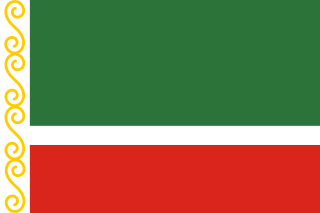
Chechnya, officially the Chechen Republic, is a republic of Russia. It is situated in the North Caucasus of Eastern Europe, between the Caspian Sea and Black Sea. The republic forms a part of the North Caucasian Federal District, and shares land borders with Georgia to its south; with the Russian republics of Dagestan, Ingushetia, and North Ossetia–Alania to its east, north, and west; and with Stavropol Krai to its northwest.

The First Chechen War, also referred to as the First Russo-Chechen War, was a struggle for independence waged by the Chechen Republic of Ichkeria against the Russian Federation from 11 December 1994 to 31 August 1996. This conflict was preceded by the battle of Grozny in November 1994, during which Russia covertly sought to overthrow the new Chechen government. Following the intense Battle of Grozny in 1994–1995, which concluded with a pyrrhic victory for the Russian federal forces, Russia's subsequent efforts to establish control over the remaining lowlands and mountainous regions of Chechnya were met with fierce resistance and frequent surprise raids by Chechen guerrillas. The recapture of Grozny in 1996 played a part in the Khasavyurt Accord (ceasefire), and the signing of the 1997 Russia–Chechnya Peace Treaty.
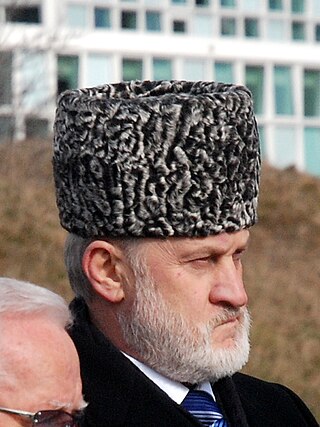
Akhmed Halidovich Zakayev is a Chechen statesman, political and military figure of the unrecognised Chechen Republic of Ichkeria (ChRI). Having previously been a Deputy Prime Minister, he now serves as Prime Minister of the ChRI government-in-exile. He was also the Foreign Minister of the Ichkerian government, appointed by Aslan Maskhadov shortly after his 1997 election, and again in 2006 by Abdul Halim Sadulayev. An active participant in the Russian-Chechen wars, Zakayev took part in the battles for Grozny and the defense of Goyskoye, along with other military operations, as well as in high-level negotiations with the Russian side.

The Second Chechen War took place in Chechnya and the border regions of the North Caucasus between the Russian Federation and the breakaway Chechen Republic of Ichkeria, from August 1999 to April 2009.
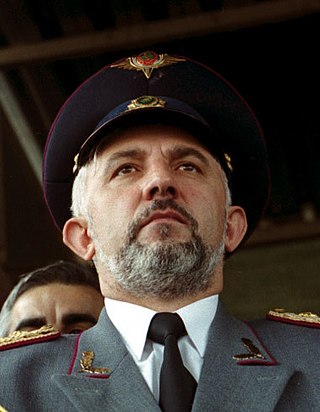
Aslan (Khalid) Aliyevich Maskhadov was a Soviet and Chechen politician and military commander who served as the third president of the unrecognized Chechen Republic of Ichkeria.

Alu Dadashevich Alkhanov is a Russian politician and the former president of Russia's Chechen Republic. He is a career police officer who fought within the ranks of the Russian Armed Forces during the First Chechen War. He was elected as president on 30 August 2004. On 15 February 2007, Russian president Vladimir Putin dismissed Alkhanov as Chechen president and appointed him a Deputy Justice Minister of Russia.
The Kavkaz Center is a privately run website/portal which aims to be "a Chechen internet agency which is independent, international and Islamic". The stated mission of the site is to report events related to Chechnya and also to "provide international news agencies with news-letters, background information and assistance in making independent journalistic work in North Caucasus".
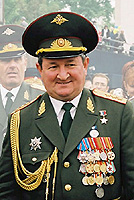
Gennady Nikolayevich Troshev was a Russian colonel general and a former commander of the North Caucasus Military District, including Chechnya, during the Second Chechen War. He was awarded a Hero of Russia award.

The Chechen Republic of Ichkeria, known simply as Ichkeria, and also known as Chechnya, was a de facto state that controlled most of the former Checheno-Ingush ASSR from 1991 to 2000 and has been a government-in-exile since.

Doku Khamatovich Umarov, also known as Dokka Umarov as well as by his Arabized name of Dokka Abu Umar, was a Chechen mujahid in North Caucasus. Umarov was a major military figure in both wars in Chechnya during the 1990s and 2000s, before becoming the leader of the greater insurgency in the North Caucasus. He was active mostly in south-western Chechnya, near and across the borders with Ingushetia and Georgia.
Movladi Saidarbievich Udugov is the former First Deputy Prime Minister of the Chechen Republic of Ichkeria (ChRI). As a Chechen propaganda chief, he was credited for the Chechens' victory on the information front during the First Chechen War.

The 1999 war in Dagestan, also known as the Dagestan incursions, was an armed conflict that began when the Chechen-based Islamic International Peacekeeping Brigade (IIPB), an Islamist group led by Shamil Basayev, Ibn al-Khattab, Ramzan Akhmadov and Arbi Barayev, invaded the neighboring Russian republic of Dagestan on 7 August 1999, in support of the Shura of Dagestan separatist rebels. The war ended with a major victory for the Russian Federation and Republic of Dagestan and the retreat of the IIPB. The invasion of Dagestan alongside a series of apartment bombings in September 1999 served as the main casus belli for the Second Chechen War.
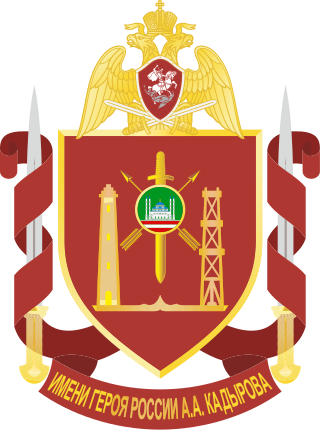
The 141st Special Motorized Regiment, also known as the Kadyrovites and the Akhmat special forces unit, is a paramilitary organization in Chechnya, Russia, that serves as the protection of the Head of the Chechen Republic. The term Kadyrovtsy is commonly used in Chechnya to refer to any armed, ethnically-Chechen men under the control of Head of the Chechen Republic Ramzan Kadyrov, although nominally they are under the umbrella of the National Guard of Russia. As of 2023, the regiment's official commander was Adam Delimkhanov, a close ally of Kadyrov.

The Republic of Chechnya is a constituent republic and federal subject of the Russian Federation. It is located in the Caucasus region in southwest Russia. It is the political successor of the Checheno-Ingush Autonomous Soviet Socialist Republic. From a centralized form of government during the existence of the Soviet Union, the republic's political system went upheavals during the 1990s with the establishment of the Chechen Republic of Ichkeria, leading to the First Chechen War and the Second Chechen War which left the republic in total devastation. In 2000, following Russia's renewed rule, a local, republican form of government was established in the republic under the control of the Russian federal government.
The Kizlyar–Pervomayskoye hostage crisis, also known in Russia as the terrorist act in Kizlyar, occurred in January 1996 during the First Chechen War. What began as a raid by Chechen separatist forces led by Salman Raduyev against a federal military airbase near Kizlyar, Dagestan, became a hostage crisis involving thousands of civilians, most of whom were quickly released. It culminated in a battle between the Chechens and Russian special forces in the village of Pervomayskoye, which was destroyed by Russian artillery fire. Although the Chechens escaped from the siege with some of their hostages, at least 26 hostages and more than 200 combatants on both sides died. One third of the homes in Pervomayskoye were destroyed.
The International Foundation for Civil Liberties is a non-profit organization established by the Russian-British oligarch Boris Berezovsky in November 2000. The foundation is headquartered in New York City and headed by Alexander Goldfarb. The stated mission of the foundation is "to provide financial, legal, informational and logistical resources to secure human rights and civil liberties in Russia."
Estimates of casualties in the Second Chechen War vary wildly, from 25,000 to 200,000 civilian dead plus 8,000 to 40,000 Russian military.
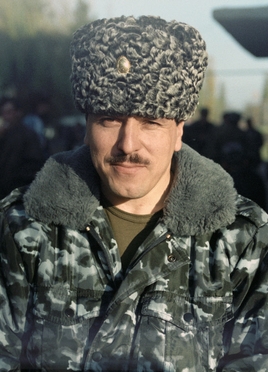
Vakha Khamidovich Arsanov was a Chechen divisional general and politician who was Vice President of Ichkeria from 1997 to 2001.
The Borozdinovskaya operation was a zachistka-type operation by Russian forces in Borozdinovskaya, Chechnya, on June 4, 2005, during the Second Chechen War. Members of the Special Battalion Vostok, an ethnic Chechen Spetsnaz unit of the Russian GRU, killed or disappeared 12 people in the ethnic minority Avar village of Borozdinovskaya, near the border with the Dagestan. Representatives of the Russian federal authorities expressed outrage over the incident, and the commander of the unit responsible was convicted.
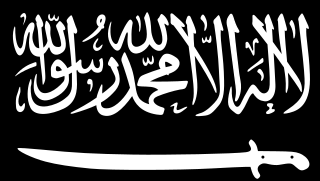
The Province of Nokhchicho was the Chechen-based wing of the Caucasus Emirate organisation. It was created in 2007 as one of the Emirate's six vilayats, replacing the Chechen Republic of Ichkeria.













